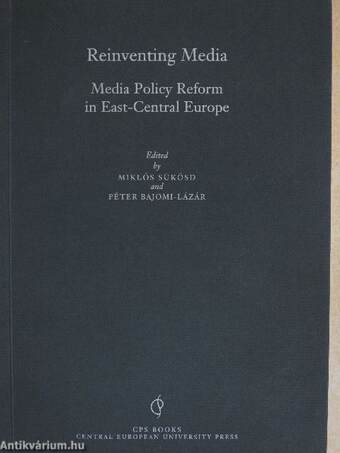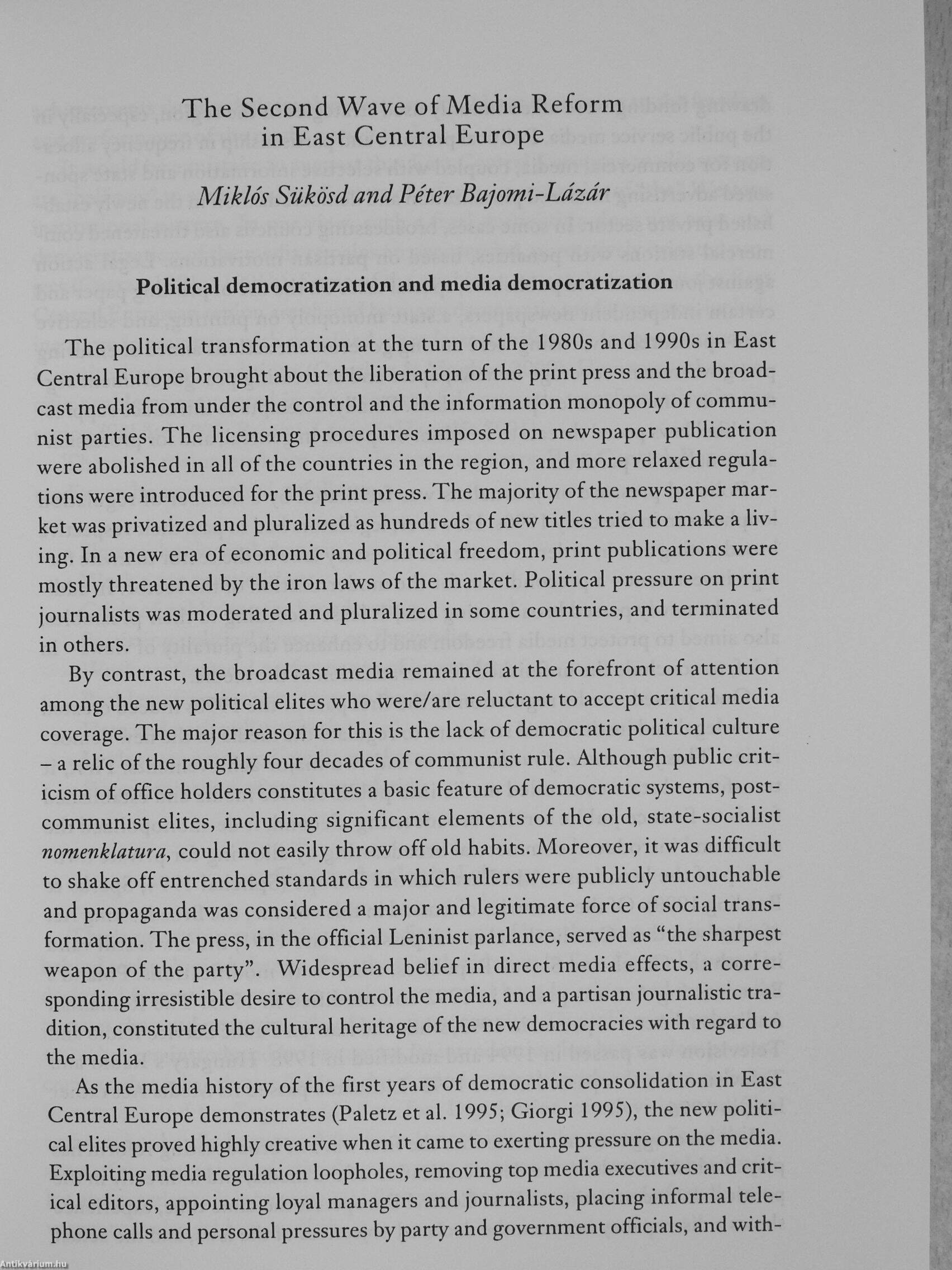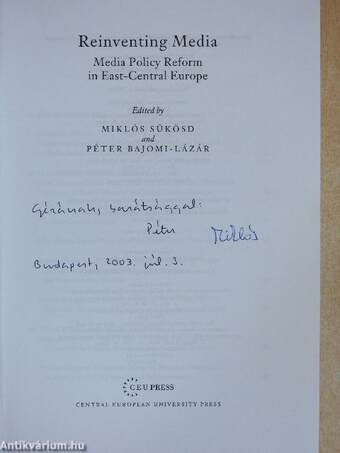1.061.872
kiadvánnyal nyújtjuk Magyarország legnagyobb antikvár könyv-kínálatát

VISSZA
A TETEJÉRE
JAVASLATOKÉszre-
vételek
Reinventing Media (dedikált példány)
Media Policy Reform in East-Central Europe
| Kiadó: | Central European University Press |
|---|---|
| Kiadás helye: | Budapest |
| Kiadás éve: | |
| Kötés típusa: | Ragasztott papírkötés |
| Oldalszám: | 273 oldal |
| Sorozatcím: | CPS Books |
| Kötetszám: | |
| Nyelv: | Angol |
| Méret: | 23 cm x 17 cm |
| ISBN: | 963-9241-49-0 |
| Megjegyzés: | Sükösd Miklós és Bajomi-Lázár Péter szerkesztők által dedikált példány. |
naponta értesítjük a beérkező friss
kiadványokról
naponta értesítjük a beérkező friss
kiadványokról
Előszó
TovábbFülszöveg
The emergence of democratic regimes in post-communist East-Central Europe brought an end to institutionalized political censorship. In its place, the media found itself confronted by new and often complex challenges. The emerging political elite, for example, proved highly sensitive to critical coverage and very adept at finding ways to stifle investigative journalism. In some cases, governments exerted direct political pressure on both the commercial and public sector, while in several countries in the region public broadcasting seemed to have been caught in a state of permanent crisis.
Within the media itself, there have been serious questions concerning minority representation, public access, and the development of professional standards. Frustrated by increasing commercialization and dilatory institutions, some have gone so far as to contest the freedoms they fought for during the years of communist subjugation. In the early 1990s, there were numerous calls for authoritative... Tovább
Fülszöveg
The emergence of democratic regimes in post-communist East-Central Europe brought an end to institutionalized political censorship. In its place, the media found itself confronted by new and often complex challenges. The emerging political elite, for example, proved highly sensitive to critical coverage and very adept at finding ways to stifle investigative journalism. In some cases, governments exerted direct political pressure on both the commercial and public sector, while in several countries in the region public broadcasting seemed to have been caught in a state of permanent crisis.
Within the media itself, there have been serious questions concerning minority representation, public access, and the development of professional standards. Frustrated by increasing commercialization and dilatory institutions, some have gone so far as to contest the freedoms they fought for during the years of communist subjugation. In the early 1990s, there were numerous calls for authoritative solutions. Most countries in the region reformed their media industries through broadcasting acts and yet, many problems still persist. The need for informed and imaginative debate is as strong as ever. This volume contains ten studies that explore the current situation of the media in East-Central Europe. The first section, entitled Reinventing Media Systems, addresses the reform of public television; the application of European legal standards; government pressure on media institutions and markets; media developments in the post-war Balkans; and the coverage of the EU and NATO accession process. In part two, Minorities and Media Reform, chapters deal with questions of access and representation of minorities, with a specific focus on ethnic minorities, gays and lesbians, and the physically challenged. Each case study was written in the context of a potentially new generation of broadcasting acts. Besides analyzing the current challenges faced by the media, every chapter includes timely policy recommendations for reform. These findings are based on research carried out in 2000 and 2001 under the International Policy Fellowship Scheme, a program jointly administered by the Open Society Institute and the Center for Policy Studies from the Central European University.
The Center for Policy Studies is an academic unit within the Central European University dedicated to identifying and analyzing policy issues. Our belief is that the experiences of post-socialist transition can be usefully shared with countries enduring great social transformation, but that the translation of these local experiences requires a sound appreciation of policy contexts. We are committed to strengthening local capacity for critical policy analysis and pursue research that is interdisciplinary and carried out with partners in the wider policy community. We work closely with institutes and researchers from the region, develop education programs in public policy, and, in conjunction with the Open Society Institute, provide an annual fellowship program.
The International Policy Fellowship program supports the research and policy training of open society leaders from regions of interest to the Soros foundations network including Central and Eastern Europe, the former Soviet Union, and Central and Southeast Asia. The program aims to increase local capacities for well-researched policymaking while preventing 'brain drain' by serving as the first and, in many countries, the only open funding competition that provides leaders from all sectors with the opportunity to work on mentored policy projects, conduct research trips and receive training while remaining in their home countries. Fellows are thus able to conduct original field research to benefit their communities while establishing and maintaining affiliations with local policymaking organizations that enhance the long-term impact of their work. Vissza
Témakörök
- Művészetek > Rádió-TV-újságírás
- Idegennyelv > Idegennyelvű könyvek > Angol > Művészetek > Egyéb
- Idegennyelv > Idegennyelvű könyvek > Angol > Művelődéstörténet
- Művelődéstörténet > Kultúra > Kultúrpolitika
- Jogtudomány > Jogi ismeretek > Egyéb
- Idegennyelv > Idegennyelvű könyvek > Angol > Jogtudomány > Egyéb
- Idegennyelv > Idegennyelvű könyvek > Angol
- Dedikált, aláírt kiadványok > Idegennyelv > Szerkesztő által > Dedikált kötetek
- Dedikált, aláírt kiadványok > Jogtudomány > Szerkesztő által > Dedikált kötetek
- Dedikált, aláírt kiadványok > Művelődéstörténet > Szerkesztő által > Dedikált kötetek
- Idegennyelv > Dedikált, aláírt kötetek > Szerkesztő által > Dedikált kötetek
- Jogtudomány > Dedikált, aláírt kötetek > Szerkesztő által > Dedikált kötetek
- Művelődéstörténet > Dedikált, aláírt kötetek > Szerkesztő által > Dedikált kötetek
- Dedikált, aláírt kiadványok > Művészetek > Rádió-TV-újságírás > Szerkesztő által > Dedikált kötetek
- Művészetek > Dedikált, aláírt kötetek > Szerkesztő által > Dedikált kötetek


















